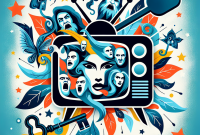
The Impact of Streaming Services on the Future of Entertainment
Streaming services have revolutionized the way we consume entertainment. From movies and TV shows to music and live events, the rise of platforms like Netflix, Amazon Prime, Hulu, and Disney+ has transformed the entertainment industry. As the popularity of streaming continues to grow, its impact on the future of entertainment cannot be overstated. In this article, we will explore the various ways in which streaming services are shaping the entertainment landscape and what this means for the future.
Changing Consumer Behavior
One of the most significant impacts of streaming services on the future of entertainment is the shift in consumer behavior. With the convenience of on-demand streaming, audiences are no longer tied to traditional TV schedules or physical media. Instead, they can access a vast library of content at any time, from any device. This has led to a decline in DVD and Blu-ray sales, as well as a decrease in cable and satellite TV subscriptions. As streaming becomes more prevalent, the way people discover, consume, and interact with entertainment is undergoing a fundamental change.
Content Creation and Distribution
Streaming services have also transformed the way content is created and distributed. With the rise of original programming on platforms like Netflix and Amazon Prime, traditional studios are facing stiff competition. These streaming giants are investing heavily in original content, often with big-name actors, directors, and producers. This has led to a golden age of television, with high-quality series and films that rival those seen in theaters. Furthermore, the direct-to-consumer model of streaming services has bypassed the need for traditional distribution channels, giving creators more control and flexibility in bringing their work to audiences.
Global Impact and Accessibility
Another aspect of the impact of streaming services on the future of entertainment is their global reach and accessibility. Unlike traditional media, which is often limited by geographic boundaries, streaming services can reach audiences around the world. This has led to increased diversity in content, as well as the opportunity for international collaboration. Furthermore, the rise of streaming has made entertainment more accessible to people in remote or underprivileged areas, who may not have had access to traditional forms of media. As a result, streaming services are playing a significant role in shaping a more inclusive and diverse entertainment landscape.
Redefining the Theatrical Experience
Streaming services have also sparked a debate about the future of the theatrical experience. With the advent of day-and-date releases and exclusive streaming premieres, audiences are no longer limited to the cinema for new releases. This has led to a shift in the way films are marketed and distributed, as well as a reevaluation of the traditional theatrical window. While some argue that streaming is a threat to the cinema industry, others see it as an opportunity to expand the ways in which audiences can experience entertainment. The ongoing debate about the role of streaming in the theatrical experience will continue to shape the future of entertainment.
The Future of Advertising and Revenue Models
Finally, the impact of streaming services on the future of entertainment extends to advertising and revenue models. With the rise of ad-supported streaming platforms like Hulu and Peacock, as well as the emergence of subscription-based services, the traditional ad-break model of television is being disrupted. This has forced advertisers, networks, and streaming services to reconsider how they reach audiences and generate revenue. Additionally, the proliferation of streaming has given rise to new monetization strategies, such as product placement, branded content, and interactive advertising. As the landscape continues to evolve, the future of advertising and revenue models in entertainment will be shaped by streaming services.
FAQs
What are the most popular streaming services?
The most popular streaming services include Netflix, Amazon Prime, Hulu, Disney+, HBO Max, and Apple TV+. These platforms offer a wide range of content, from movies and TV shows to original programming and documentaries.
How are streaming services impacting traditional media?
Streaming services are challenging traditional media by offering more convenience, choice, and control to audiences. This has led to a decline in DVD and Blu-ray sales, as well as a shift away from traditional TV and cable subscriptions.
What is the future of the theatrical experience in the age of streaming?
The future of the theatrical experience is undergoing a transformation due to the rise of streaming. While some see streaming as a threat to cinemas, others view it as an opportunity to expand the ways in which audiences can enjoy new releases.
Conclusion
Streaming services have had a profound impact on the future of entertainment, influencing consumer behavior, content creation, global accessibility, the theatrical experience, and revenue models. As the industry continues to evolve, the role of streaming in shaping the future of entertainment cannot be ignored. Whether it’s the way we watch movies, listen to music, or engage with live events, streaming services are at the forefront of redefining the entertainment landscape. As audiences and creators embrace this new era of streaming, the future of entertainment promises to be more diverse, accessible, and innovative than ever before.






